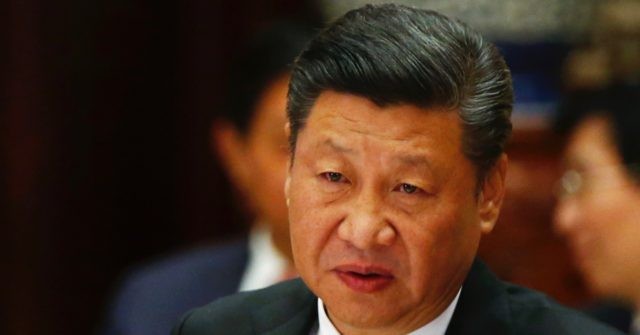China’s Foreign Ministry lashed out on Monday, claiming that the basis for sanctions levied against communist officials by the EU and the UK were based on “lies and disinformation” about the concentration camp region of Xinjiang.
In a joint effort on Monday, the United Kingdom, European Union, United States, and Canada announced a series of targeted sanctions against CCP officials, as well as the Public Security Bureau of the Xinjiang Production and Construction Corps, for their role in what has been alleged to be a genocide against the Muslim Uyghurs in the western region.
The announcement marks the first sanctions against the leftist dictatorship by either the European Union or the United Kingdom in over 30 years. It is currently estimated that the CCP has constructed 1,200 concentration camps in Xinjiang, where as many as as 3 million Uyghur people, and other ethnic minorities such as Kazakhs and Kyrgyz people, have been forcefully interned.
Responding to the EU announcement, the CCP’s Foreign Ministry said: “This move, based on nothing but lies and disinformation, disregards and distorts facts, grossly interferes in China’s internal affairs, flagrantly breaches international law and basic norms governing international relations, and severely undermines China-EU relations.”
The CCP statement went on to launch threats at the bloc, saying: “The Chinese side urges the EU side to reflect on itself, face squarely the severity of its mistake and redress it. It must stop lecturing others on human rights and interfering in their internal affairs. It must end the hypocritical practice of double standards and stop going further down the wrong path. Otherwise, China will resolutely make further reactions.”
China also announced a retaliatory strike, imposing sanctions of its own on “ten individuals and four entities on the EU side that severely harm China’s sovereignty and interests and maliciously spread lies and disinformation.”
In an article from China’s most belligerent state-run newspaper, The Global Times, the director of the Department of European Studies at the China Institute of International Studies, Cui Hongjian, said that the EU’s sanctions were merely put forward to “highlight its political existence”.
He went on to say that the EU “perceives human rights as its cheap weapon, as it doesn’t have the financial and military power that Washington does.”
Following the EU sanction announcement, British Foreign Secretary Dominic Raab followed suit, saying: “The evidence of widespread human rights abuses in Xinjiang cannot be ignored – including mass detention and surveillance, reports of torture and forced sterilization.
“Working with our international partners we are imposing targeted sanctions to hold those responsible to account.”
‘Fervent Sinophile’ Boris Johnson Pushes for China Trade Deal, Despite Genocide Objections https://t.co/zyCogH355C
— Breitbart London (@BreitbartLondon) February 22, 2021
Responding to the sanctions, the founder and chairman of Hong Kong Watch, Benedict Rogers told Breitbart London: “These measures are extremely welcome but long overdue and not enough. I hope they mark a beginning, with more to come, and not simply a gesture to keep critics of the EU and UK trade and investment policies towards China happy.
“We need to see more robust, targeted sanctions, and a complete recalibration of China policy in both the EU and the UK. But having called for Magnitsky sanctions, of course I welcome today’s announcement and will watch the next steps closely.”
Both Prime Minister Boris Johnson’s government and Eurocrats in Brussels have been pushing for deeper economic ties with the communist nation, despite the sanctions gesture.
Last week, for example, a British government review entitled ‘Global Britain in a Competitive Age’ found that China represents the “biggest state-based threat” to Britain’s economic security — but despite this, the government paper called for the United Kingdom to seek “deeper trade links and more Chinese investment“.
Johnson’s government has also consistently tried to stave off bi-partisan attempts, including from members of his own party, to add a genocide amendment to the Trade Bill, which would require a High Court review of trade deals with countries, like China, which have been accused of committing genocide.
One of the leaders of the campaign, former Tory party leader Sir Iain Duncan Smith, questioned why the sanctions were so limited in scope, asking why Chairman Xi Jinping’s name was not on the list of individuals targeted.
The European Union, for its part, hastily signed a trade agreement with the Chinese Communist Party shortly before Joe Biden was sworn in as President of the United States.
The bloc was widely criticised for the deal, which failed to require that the Chinese state eliminate modern slavery, in places such as the concentration camp province of Xijiang, as a prerequisite for the deal.
Within the deal, Beijing conceded merely to “work towards” adopting international standards for labor rights.
The Chinese state overtook the United States as the European Union’s top trading partner in 2020, as ties between Brussels and the communist dictatorship in Beijing continue to deepen. https://t.co/RzgCixukoq
— Breitbart London (@BreitbartLondon) February 17, 2021
For all the latest news read by John B Wells. “Take no part in the unfruitful works of darkness, but instead expose them.” – Ephesians 5:11





